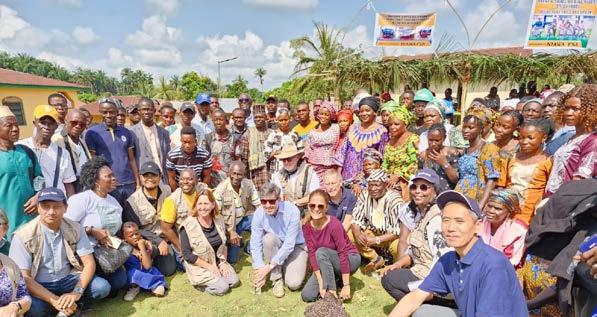
4 minute read
Independent Magazine - Issue n.5, 2023
IFAD AND THE GOVERNMENT OF SIERRA LEONE STRENGTHEN STRATEGIC PARTNERSHIPS
Adelegation of IFAD Executive Board members from eight countries visited Sierra Leone, from 19 to 26 November 2022. The visit promoted strategic partnerships between the Government and IFAD on agriculture and rural development. Discussions built on the efforts that the Government and IFAD have undertaken to address the findings and recommendations that emerged from the 2020 Country Strategy and Programme Evaluation (CSPE), carried out by the Independent Office of Evaluation (IOE).
The IFAD Executive Board (EB) members who attended the visit represented Canada, China, Cote d’Ivoire, Germany, Indonesia, Mexico, Nigeria and Switzerland, and included the new Chair of the IFAD Evaluation Committee, H.E. Miguel Jorge García Winder, Ambassador and Permanent Representative of Mexico to the Rome-based UN agencies. Dr Indran Naidoo, IOE Director, joined the delegation which also featured IFAD Management representatives, including Donal Brown, Associate Vice President, Programme Management Department, Sana Jatta, Regional Director for West and Central Africa, and Pascaline Barankeba, Country Director for Sierra Leone and Liberia.
“IFAD will never let down Sierra Leone. It is committed to accompanying Sierra Leone in its process of recovery and rural development”, affirmed Ms Barankeba.
The 2020 CSPE report highlighted that the Government of Sierra Leone has been a close partner of IFAD, providing active support in the design and implementation of projects. Over the years, the Government has played a strong role in the conception and implementation of the lending operations. Its decision to have a dedicated National Project Coordination Unit to coordinate all IFAD-supported projects has led to good implementation of projects under its charge. In the same vein, its decision to decentralize part of its project management staff to the district level, to be closer to project activities, has been a further step in the right direction.
During the course of the visit, the EB delegation gained deeper knowledge and understanding of these undertakings, and of how they relate to IFAD’s work in Sierra Leone, including the challenges and constraints faced by IFAD-supported operations in the country. On-site visits took place at IFAD-supported projects in Bo, in the south of the country, Kenema in the east, and Makeni and Lungi in Port Loko, north of the country. During the visits, Board representatives saw first-hand how programme participants, in particular women and young people, have improved their lives, and discussed with them what further challenges they face. In addition, the EB members also held discussions with farmers’ organizations, cooperatives, small- and medium-enterprise representatives, and local government authorities.
The two projects currently ongoing in Sierra Leone are the Agriculture Value Chain Development Project (AVDP) and the Rural Finance and Community Improvement Programme Phase II (RFCIP2). The overall goal of the AVDP is to improve the livelihoods, food security and climate change resilience of rural farming households in Sierra Leone. With regard to the RFCIP2, the programme seeks to strengthen the capacity of the finance service providers in rural areas, in order to increase their outreach and provide demand-driven services to rural communities.
The delegation’s comprehensive perspective of the country situation was further enhanced through a series of high-level meetings with Sierra Leone’s senior policymakers. In Freetown, the Members of the EB met with the President of the Republic of Sierra Leone, H.E. Julius Maada Bio; the Minister of Agriculture and Forestry; the Minister of Finance, Planning and Economic Development; the Minister of Foreign Affairs and International Cooperation; the Minister of Local Government; the Minister of Trade; the Minister of Youth Affairs; the Minister of Gender Affairs; the Governor of the Central Bank, and other Government officials at the central and local level. They also met the United Nations Country Team and the donors in the country. These meetings provided EB members with an opportunity to discuss the Government’s vision and framework for IFAD activities for the coming years.
IFAD is the largest donor in Sierra Leone’s agricultural sector, and it has supported the government in its fight against the Ebola outbreak from 2014 to 2016. When many institutions closed or downsized their operations, IFAD-supported community banks and financial services associations known as village banks remained the sole providers of banking and financial services in most areas of the country. More recently, the Rural Poor Stimulus Facility, implemented through the Agricultural Value Chain Development Project, has helped mitigate the negative impacts of COVID-19 on the livelihoods of the small-scale farmers and other rural people across the country.










